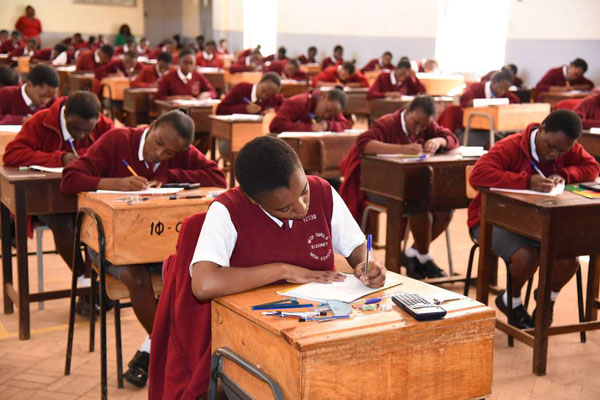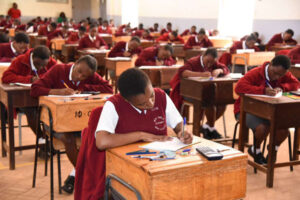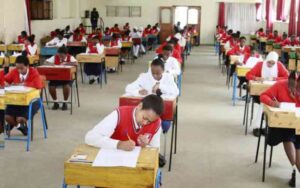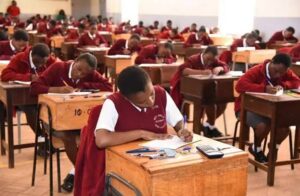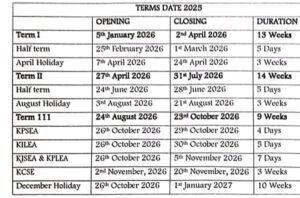Kenya recorded a decline in KCSE exam malpractice cases in 2025. Learn why irregularities fell, the reforms behind the shift, and what the Ministry of Education is planning to strengthen exam integrity.
Kenya’s 2025 KCSE examination season has ended with a remarkable shift in the fight against exam malpractice. According to Education Cabinet Secretary Julius Ogamba, only 418 candidates were implicated in cheating-related offences — a significant reduction from the 614 cases reported in 2024. While the decline is notable, the ministry has made it clear that the victory is only partial as investigations continue and any offenders will face penalties stipulated under the Kenya National Examinations Council (KNEC) Act of 2012.
The drop in irregularities is being interpreted as the result of tighter surveillance, stricter protocols, and better coordination between security teams and education stakeholders. CS Ogamba emphasised that the ministry’s emphasis this year was not merely on administering the exams, but on safeguarding the credibility of the entire assessment system. This included vetting of examiners, disqualification of compromised marking centres, and enhanced supervision throughout the four-week exam period.
Marking for the 2025 KCSE will be undertaken by 32,558 examiners stationed across 40 designated centres. The ministry has implemented new integrity filters that automatically bar examiners who have been linked to malpractice before. According to the CS, maintaining the integrity of marking is just as important as monitoring candidates during the exam. These measures aim to ensure fairness, accuracy, and transparency in the grading process.
In addition, the Kenya Junior School Education Assessment (KJSEA) marking is underway. The ministry aims to release the results by 11 December 2025, allowing early placement of learners into Senior School under the Competency-Based Education (CBE) pathways — Arts and Sports, Social Sciences, and STEM. The early release will not only ease pressure on parents but also give schools more time to prepare for admissions ahead of the festive season.
The KNEC Act of 2012 still forms the backbone of disciplinary measures for exam offences. Sanctions include deregistration of schools involved in malpractice, cancellation of results, disqualification of candidates, and even criminal prosecution for individuals or institutions that abet cheating. In 2025, these rules were enforced more strictly, with impersonation flagged as the most serious offence. Those found guilty risk being barred from sitting KCSE again until 2027.
The CS spent Friday morning in Nyamira County to supervise the final exam procedures, opening the exam container at Nyamira North headquarters before visiting Kebabe Girls in Ekerenyo. His presence in the region signaled the ministry’s commitment to ensuring the highest level of transparency right up to the last paper. The final exam, Physics Practical, symbolically marked the conclusion of the 2025 KCSE and one more step toward the system’s transition away from national examinations as Kenya gradually phases out KCSE in 2027.
For several weeks, center managers, supervisors, and invigilators worked tirelessly, many reporting to exam containers as early as 4 or 5am. Their diligence, paired with strict security protocols, contributed significantly to the smooth administration of the exams. Over 110,000 personnel were mobilised this year, representing the highest level of staffing in recent KCSE history.
The ministry also made provisions for candidates who were admitted to hospital but still wished to sit their examinations. Unfortunately, CS Ogamba confirmed that a number of candidates lost their lives during the exam period, sending condolences to the affected families on behalf of the government.
Even with KCSE now concluded, exam activity continues nationwide. Technical and Vocational Education and Training (TVET) examinations are ongoing, with 15,266 candidates undertaking Business papers and 38,959 sitting Technical exams. The CS assured that the same standards of integrity applied to KCSE are being replicated in TVET assessments.
CS Ogamba concluded with a call for continued vigilance. He urged the public, parents, and candidates to report suspicious behaviour confidentially to KNEC. Protecting the value of national certifications, he said, must remain a shared responsibility long after the last exam paper is completed.
